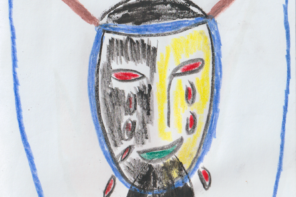Read three poems by Stanislava Mogileva, translated by Joan Brooks.
Stanislava Mogileva is one of the central figures in the F-Writing movement (Ф-письмо), which began in St. Petersburg in 2016 and has since spread across the post-Soviet literary world, amplifying young women’s voices in what remain profoundly patriarchal societies. Mogileva is among the older, leading figures of the movement. Her verse can be described as radically /im/personal, combining hypnotic, incantatory qualities with raw documentation of daily life and love, often at a level of telescopic detail. Mogileva’s second book, This Is Happening to Someone Else, published in early 2018, was widely acclaimed for its exposed, even “shameless,” depictions of feminine desire, modeling the kind of erotic self-reflection that has always been a central aspect of F-Writing.
In late 2018, Mogileva developed her practice further with the influential Diary poems, published on Facebook with selections later featured in the F-Writing and Sex Is Pure online journals. The Diary was a remarkable innovation in Russophone poetry, in which the intellectual, emotional, and erotic tumult of the Petersburg bohemian avant-garde was subsumed into a single life, body, and poetic consciousness. It was during this time that I met Mogileva, and we had a brief but powerful love affair. I want to be radically open about our remarkable roman (for Russian-speakers, as for the French, a love affair is always a novel).
Before the affair with Mogileva, I had never encountered such a ferociously tender passion, passing both into and out of me at once. It was a love that literally transformed my body, as I had begun an awkward, uncertain gender transition only the year before, and I was still half-closeted and years away from HRT. More than anything else, it was the way we talked, laughed, danced, read, wrote, loved, and fucked that finally freed me from the straightjacket of straight desire.
The three poems I have translated mark the beginning and end of our affair. My words and image pop up constantly in the poems Mogileva wrote during this time, although I am only addressed directly in the second person once (in “while the sleeper sleeps…”). My name is masked in “trip up…” by the word “burn” (ozhog—Russian autocorrect’s translation of my deadname, Dzhon).i In “I, the bottom…”, I appear only in a single stanza, as the emotional “trigger” (our fatal fight two weeks prior, when the unruly monster of dependency finally crushed our love), now fired off on a “straight dialectical” path out of the speaker’s orbit. This paradoxical image was a very fitting (in fact, devastating) description of the conflict in my soul during those final weeks, and I am as grateful for it as I am for the raptures of the first poems.
One of the central points of contact between our worldviews at the time was a fascination with movement and stillness, particularly the kind of stillness that approaches the condition of statuary.ii In many ways the Leningrad underground has always been a kind of stone army, left abandoned by imperial power, waiting for some future leap into eternity, when it will be needed again. Indeed, almost all Leningrad poets, especially those associated with F-Writing, refer to members of the community in their verse, often naming them explicitly. The “intimate readers,” who catch these references, naturally experience the texts differently from those who do not. For example, in “I, the bottom…”, although identity and gender are for the most part carefully veiled—as they are in the entire cycle—I cannot help but see the image-bodies of the addressee, the Moscow poet Ksenia Charyeva, who was visiting St. Petersburg for a reading at the time, and the sweet shoe of Petersburg poet Nikita Sungatov.
Recognizing such moments, recalling these bodies, the intimate readers receive a precious gift. Entering the text and finding our comrades there, we pass beyond the plane of earthly time into the longer, more slackened duration of the printed word. And yet these transitions are always being reversed and revised, whenever we return from our love-comrades’ poems back into life, back into all those kitchens and bedrooms, playgrounds and stairwells, bookstores and bars, where our erotic dialogues (trialogues, quadralogues, etc.) take place. In a sense, this tight-knit (i.e., fundamentally incestuous, endogamous) community of speech, thought, and desire is the true “author” of these texts, and we are but its mediums.
My living statue can be found in the works of many other Leningrad poets, but it was only in Mogileva’s texts that I ever felt its heartbeat and saw her face.
i A word-for-word rendition of these lines would be “autocorrect changes name to / burn,” as Russian requires neither a gendered personal pronoun or an indefinite article in this syntagm. An alternative translation would be “autocorrect changes their name to ‘burn’.”
ii The name Zhanna in “while the sleeper sleeps…” is the Russified version of Joan, referring to Joan of Arc. Mogileva’s image of Joan’s “stoning and stone-making face” emerged from our conversations about the image of an androgynous, militant female.In Mogileva’s lexicon, the phrase, «Это – полная Жанна» (that’s total Zhanna) is an ironic way of saying “that’s hardcore.”Mogileva was the first person to call me Joan –not Zhanna, but Dzhoan, as the English name is spelled (pronounced with two syllables, Dzho-an).
Joan Brooks is a writer, teacher, and translator based in Pittsburgh, PA. Having lived and worked much of her life in the former Soviet Union—primarily in St. Petersburg, Russia—Brooks maintains a bicultural practice that includes autoethnographic stories and essays, bilingual poetry, translations of leftist and queer-feminist Russophone poetry, experiments in therapeutic trans pornography, spiritual mathematics, pushkinistika, and rock operas. Brooks is currently reviving her teaching practice, preparing lectures on literature, philosophy, and culture for students in the former Soviet Union and across the world.
Stanislava Mogileva is a poet, curator, and co-editor of the F-Writing online journal. She was born in the industrial mining city of Norilsk, Siberia in 1983. Her ancestry is Ukrainian, Tatar, and Yakut. Her poems have appeared in the journals NLO, Vozdukh, Volga, kntxt, PARADIGMA, [Translit], Sex Is Pure, and others. Her work is included in the international anthology F-Letter: New Russian Feminist Poetry (isolarii, 2020). She is the author of two books, Reverse Order (MRP, 2016) and This Is Happening to Someone Else (Argo-Risk, 2018). Her poems have been translated into English, Swedish, and Polish. She lives in St. Petersburg.
Translation Series curated by Jae Kim.




